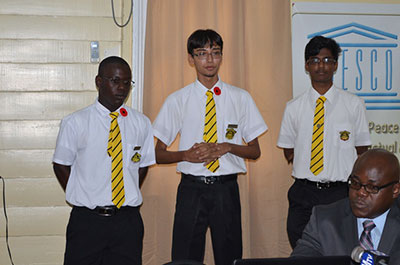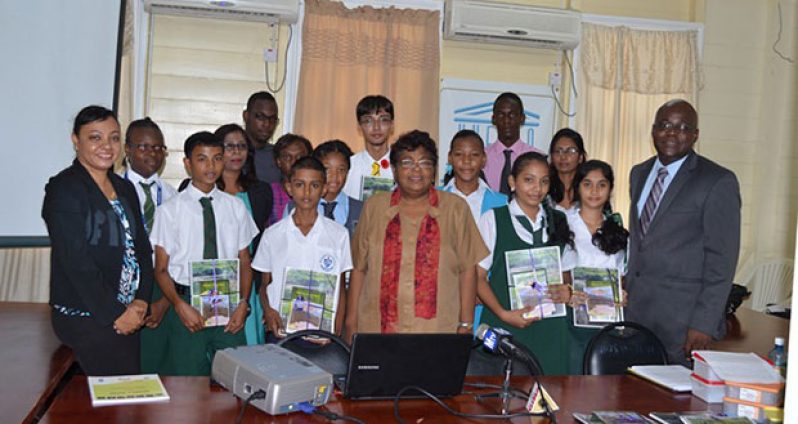UNESCO pays tribute to the late Navin Chandarpal
–for his dedication to the teaching of the sciences
AS part of Guyana’s observance of World Science Day for Peace and Development, the Schools’ Science projects were launched Monday at the United Nations Educational, Scientific and Cultural Organisation (UNESCO) under the theme: ‘Quality Science Education: Ensuring a sustainable future for all’.NAVIN CHANDARPAL TRIBUTES

Tributes were also paid to the late Advisor to the President on Sustainable Development, Mr Navin Chandarpal, who was very active in Micro-Science for schools, and a driving force for the programme at UNESCO.
The aim of the Schools’ Science Clubs is to bridge the gap between science education and achieving Guyana’s national goals such as the Low Carbon Development Strategy (LCDS) and the poverty reduction strategy.
QC GROUP
Three members of the Queen’s College Science Club Group, who spent one month in Barbados for Innovation in Science Engineering, hosted by the Caribbean Science Foundation at the University of the West Indies, also launched their school’s science club that day.
This programme brings together select groups of students from around the Region and challenges them to engage in further study in STEM subject areas at the university level.
Inge Nathoo, Secretary-General of the Guyana National Commission for UNESCO said that prior to the approval of the Science and Technology policy, Chandarpal served as the Convener to the Science Policy Working Group from 2010 to 2011.
That group was tasked with updating the existing Science and Technology Policy and the preparation of a framework document through a series of stakeholder consultations, working group meetings and site visits. Technical and financial support was provided by UNESCO.
Chandarpal also played a pivotal role in the re-establishment of the National Science and Technology Council for Guyana. The Government of Guyana also recently approved the Science and Technology policy which was led by Chandarpal as well.
As a result, with recent support from UNESCO, Guyana has been selected as a pilot country, and one of the first countries in the Region to draft an Education for Sustainable Development policy.
“We have infused climate change education using the Inquiry-Based Science Education, and there are several pilot programmes which are now being expanded. We have over 90 Secondary Schools using micro-science kits,” Petal Jetto, Science Coordinator attached to the Ministry of Education said.
She added that the number of students entering up to sit Science at CESC is increasing, as well as percent passes, which is significant since there seems to be a decline globally in the number of young persons interested in Science. “We want to really promote hands-on and this is why we are launching Science and Environmental clubs, because we want to bring what is learnt inside of the classroom, outside of the classroom. How do we use our science to solve problems and build a more sustainable future? We really cannot talk sustainability without action.”
LEAD COUNTRY
Jetto said Guyana is the lead country in micro-science in the Caribbean. “Sustainable development begins when students look at local problems within their school or community and use Science, Technology, Engineering and Mathematics (STEM).”
Jettoo, however, said that after science fairs, nothing is done with the beautiful projects and ideas that were displayed, thus, the formation of the Science and Environmental clubs to sustain and implement some of these projects.
Some students address alternative fuel, school gardens, wind power and organic farming utilising what would normally be termed as waste, as part of their science projects.
Chief Education Officer Olato Sam said the theme for this year’s World Science Day is quite appropriate to appreciate all of the broader policy initiatives such as LCDS. Sam opined that the education for sustainable development policy would put Guyana in a very unique place regionally and internationally.
“We need young, bright individuals such as those in the room here to begin to conceptualise how we are going to use the science education they get in the classroom, and the information they are exposed to online to solve our problems in life,” Sam said.
He added that while Guyana is blessed with an abundance of natural resources, it is also facing some challenges in relation to climate change and natural and environmental disasters. He added that young people are the ones who would have to play a major part in coming up with the ideas to aid in solving some of these problems.
(GINA)



.jpg)










